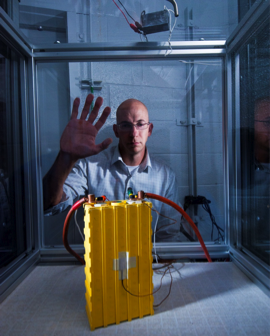The Battery Abuse Testing Laboratory (BATLab) at Sandia is an internationally recognized leader in energy storage system safety research. The BATLab is committed to serving the energy storage community and the national interest with cutting-edge research programs, the highest quality testing results, and leadership in battery safety and reliability. For more than 13 years, the BATLab has supported the Department of Energy Office of Vehicle Technologies programs, whose goal is to enable new electric vehicle technologies. The BATLab also continues to support other DOE, Department of Defense, NASA, and private industry customers.
BATLab research and development (R&D) programs focus on
- understanding the mechanisms that lead to energy storage system safety and reliability incidents,
- developing new materials to improve overall energy storage system safety and abuse tolerance,
- performing abuse testing,
- advancing testing techniques,
- performing detailed failure analyses, and
- developing strategies to mitigate energy storage cell and system failures.
In addition to core battery abuse testing capabilities, the BATLab is home to the world’s largest and most comprehensive battery calorimetry laboratory, the DOE’s largest lithium-ion cell prototyping facility, battery component analytical and diagnostic capabilities, and extensive failure-analysis and characterization tools.
Battery Safety R&D
Using the results from our testing and evaluation, our scientists and technicians work with our industry/manufacturing partners to
- understand failure mechanisms in cells and battery systems for the emerging global transportation markets;
- perform safety evaluations on next generation electrode materials for lithium-ion energy storage systems;
- develop advanced electrolytes that are abuse tolerant, nonflammable, and can mitigate high-rate thermal runaway reactions;
- develop testing and analytical techniques to better understand critical safety concerns with lithium-ion cells and emerging large-format cell designs; and
- partner with national and international organizations to addresses the challenges of battery failure and potential safety issues.
Contact
Kyle Fenton
krfento@sandia.gov

